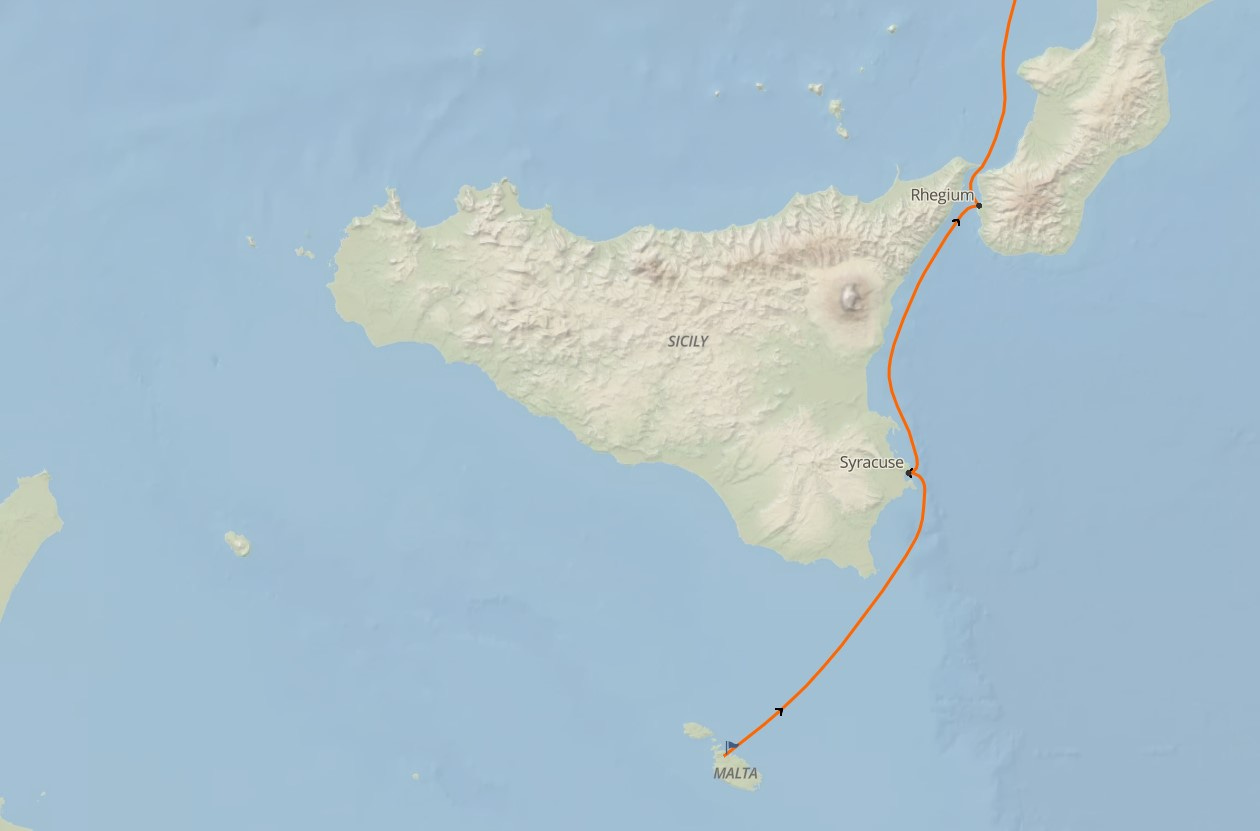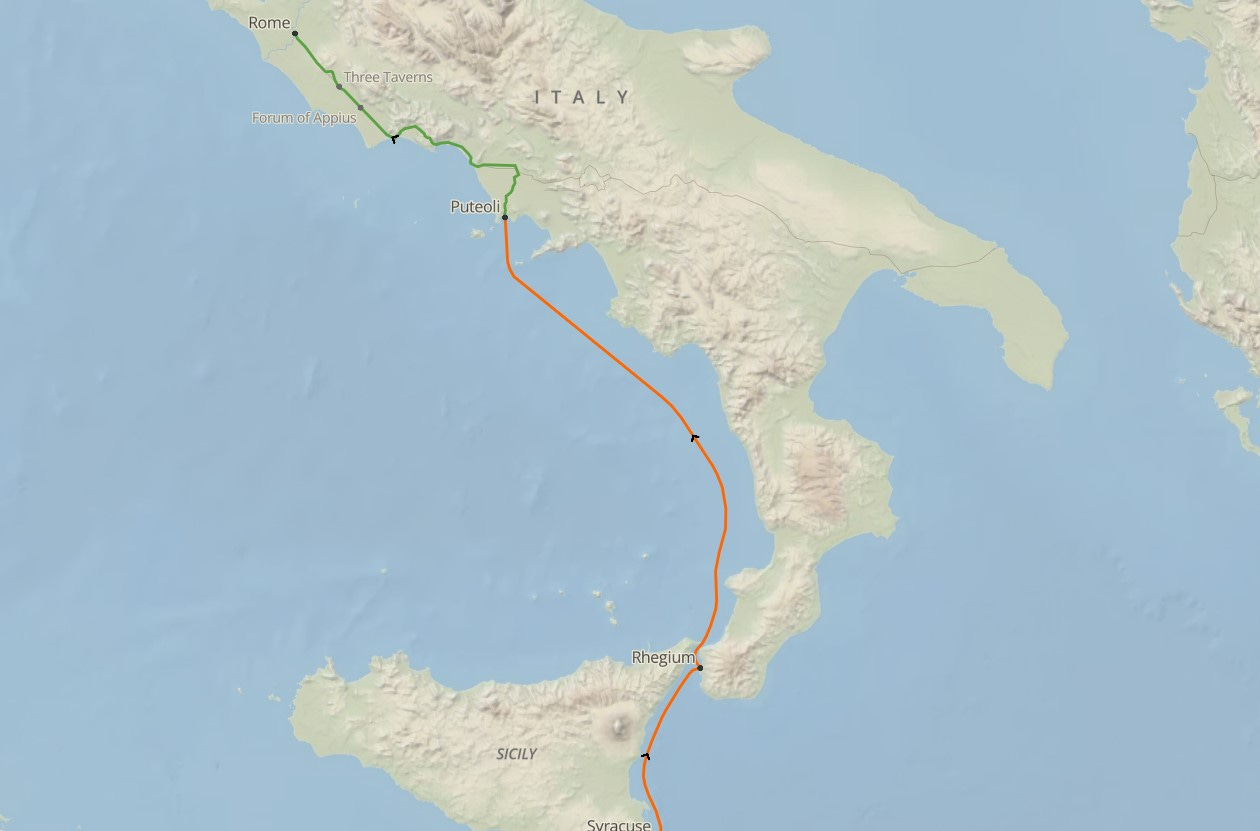A Study of Acts: Traveling to Rome
Acts 28:11-16 - Encouragment can come from being with many brothers and sisters in Christ.
“After three months we put out to sea in a ship that had wintered in the island—it was an Alexandrian ship with the figurehead of the twin gods Castor and Pollux. We put in at Syracuse and stayed there three days. From there we set sail and arrived at Rhegium. The next day the south wind came up, and on the following day we reached Puteoli. There we found some brothers and sisters who invited us to spend a week with them. And so we came to Rome. The brothers and sisters there had heard that we were coming, and they traveled as far as the Forum of Appius and the Three Taverns to meet us. At the sight of these people Paul thanked God and was encouraged. When we got to Rome, Paul was allowed to live by himself, with a soldier to guard him.”
Acts 28:11-16 NIV
Paul and his traveling companions and the Roman centurion and soldiers put to sea after three months on Malta. They were welcomed aboard another Alexandrian ship, likely a grain cargo carrier, with the figurehead of the twin gods Castor and Pollux at the front. It was interesting to read some commentators that thought that Paul did no evangelization in Malta, but yet other scholars noted that Publius became the first bishop of Malta and the church there was widespread by the first century A.D. Although it isn’t explicitly noted in Acts 28, because Paul healed many on Malta he likely also had plenty of time to preach the Gospel.
According to historians, sea travel in the Mediterranean in those days would resume as early as February 7 although some noted the dates as being in March. The twin figureheads of the Gemini twins (also two bright stars in the spring sky) were meant to bring fortune from the gods to those who sailed.
The group stops at Syracuse, on the eastern coast of Sicily and stays there for three days. According to Precept Austin, it was 85 miles from Malta to Syracuse. They continue on, stopping briefly at Rhegium (85 miles from Syracuse) on the Italian mainland coast across from the northeast corner of Sicily. A south wind comes up (now quite welcome) and the ship is propelled through the Straits of Messina and moves quickly up the coast to Puteoli, a distance of 200 miles. Puteoli (now Puzzoli) in on the north side of the Bay of Naples and was the major port for Rome until an artificial harbor was built by the Emperor Claudius.
Map showing the sea journey from Rhegium to Puteoli, in red, and the land journey on to Rome in green. Map found on Precept Austin.
When the group arrives in Puteoli, they meet some brothers and sisters (fellow Christians) and are invited to stay there for a week. The centurion Julius is still responsible for bringing his prisoner to Rome, but he is very willing to allow this sojourn for a week so that everyone can hear Paul’s preaching. I’m pretty certain that this kind centurion (and probably many of his soldiers) are now believers and they want to be near Paul and hear the Word of God.

Many brothers and sisters traveled from Rome to the Forum of Appius and the Three Taverns to greet Paul. The Forum of Appius was about 50 miles from Rome and the Three Taverns were 30 miles from Rome, on the famed Appian Way. The Unsplash photo above shows a remnant of this major Roman road. I’ll be honest with you - I hate cobblestones and uneven paths like this, seeing them as traps that can result in broken ankles and bad falls, but I guess the people in those days were used to these types of roads.
Paul was revived and encouraged by this joyful meeting with believers as they complete the walk to Rome, after the ordeals that he had endured over the last three years. Paul finally arrives in Rome and is allowed to live by himself with a soldier guarding him. Here is commentary from Enduring Word about this final journey recorded in Acts:
b. Landing at Syracuse: This was the first stop from Malta. Syracuse was a famous city in the ancient world, being the capital city of the island of Sicily.
i. Archimedes, the famous mathematician, had lived at Syracuse. When the Romans conquered the island, a soldier put a dagger to his throat as he worked on a math problem, drawing in the dirt. Archimedes said, “Stop, you’re disturbing up my equation!” and the soldier killed him.
c. Rhegium… Puteoli… and so we went toward Rome: As Paul and the others made their way northward up the Italian peninsula, they spent time with fellow followers of Jesus they met along the way (we found brethren, and were invited to stay with them seven days).
d. When the brethren heard about us, they came to meet us as far as the Appii Forum and Three Inns: Eventually they were greeted outside Rome by Christians from the city who came to meet them. They honored Paul by greeting him as the emperors were greeted when they arrived at Rome: they went out to meet him as he came into the city, walking the long journey (about 43 miles or 69 kilometers) to the Appii Forum to welcome Paul and his companions.
i. They had received Paul’s famous letter to the Romans a few years before, so they probably felt like they knew him already – and they certainly wanted to honor him. In light of the love and honor behind this greeting, no wonder that Paul thanked God and took courage.
ii. “Luke is far from giving the impression that Paul was the first person to bring the gospel to Rome… the presence of those Christians – the brothers, as Luke calls them – provides evidence enough that the gospel had reached Rome already.” (F.F. Bruce) There were Jewish people from Rome present at Peter’s preaching on Pentecost many years before (Acts 2:10), so there had probably been Christians from and in Rome from the beginning.
iii. One could say that they treated Paul as if he were a king. “It was a custom when an emperor visited a city for the people to go out and meet him and escort him back into the city.” (Stanley Horton)
iv. Yet, during his second Roman imprisonment, Paul was left alone and forgotten (2 Timothy 4:9-16), meaning that in some sense, the Christians at Rome didn’t (or perhaps couldn’t) maintain their love and honor of Paul.
After the group arrives in Rome, the remaining passages in Acts are written in the third person, as Luke is probably not allowed to live with Paul. Christianity had certainly arrived in this great city before Paul got there, but it is sad to know that Paul was often left alone when he was imprisoned in Rome.
My next devotional examines Acts 28:17-22, Paul summons the Jewish leaders to come and meet with him.
Heaven on Wheels Daily Prays:
Dear Lord - I thank you for the details of Paul’s journey, even at the end of Acts. I also pray that I am encouraged by other brothers and sisters of the faith. Amen.
Scripture quotations taken from the (NASB®) New American Standard Bible®, Copyright © 1960, 1971, 1977, 1995 by The Lockman Foundation. Used by permission. All rights reserved. lockman.org
Precept Austin was accessed on 2/22/2025 to review maps for Acts 28.
Commentary from Enduring Word by David Guzik is used with written permission.




